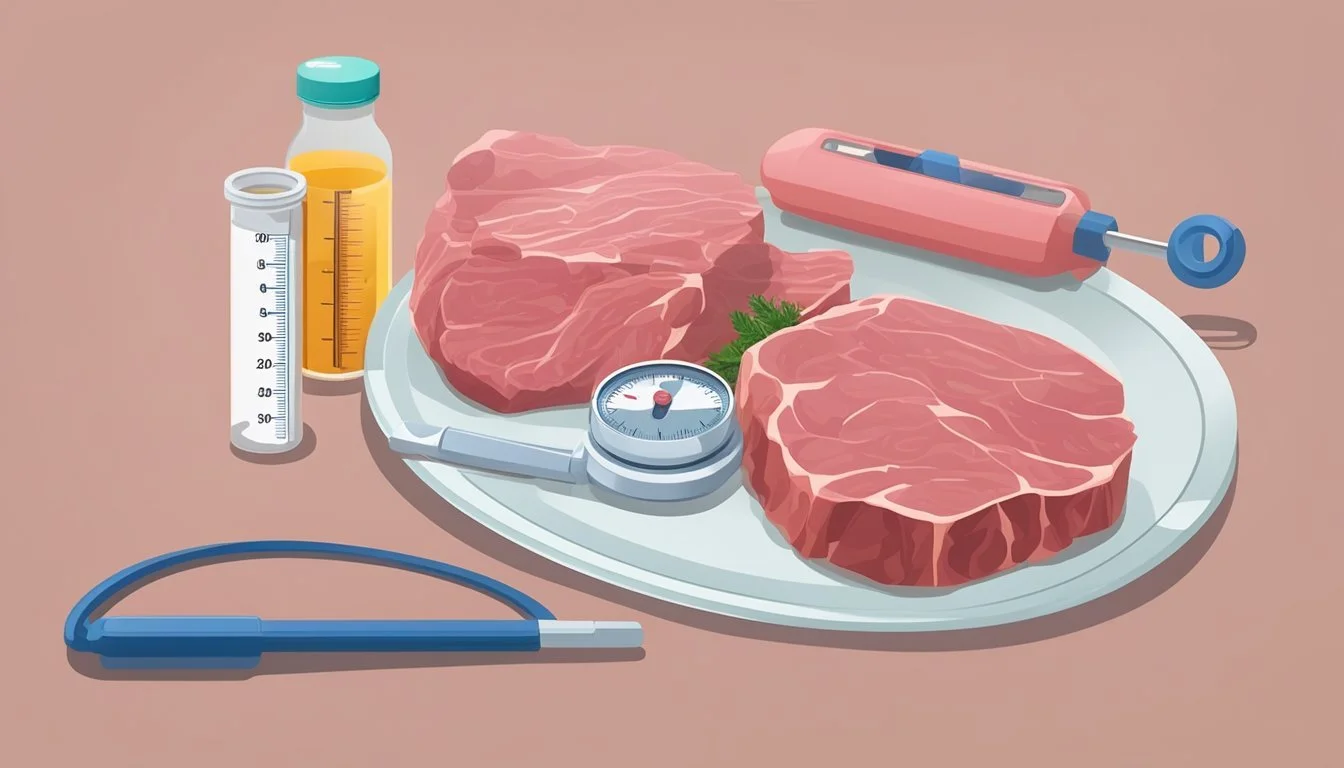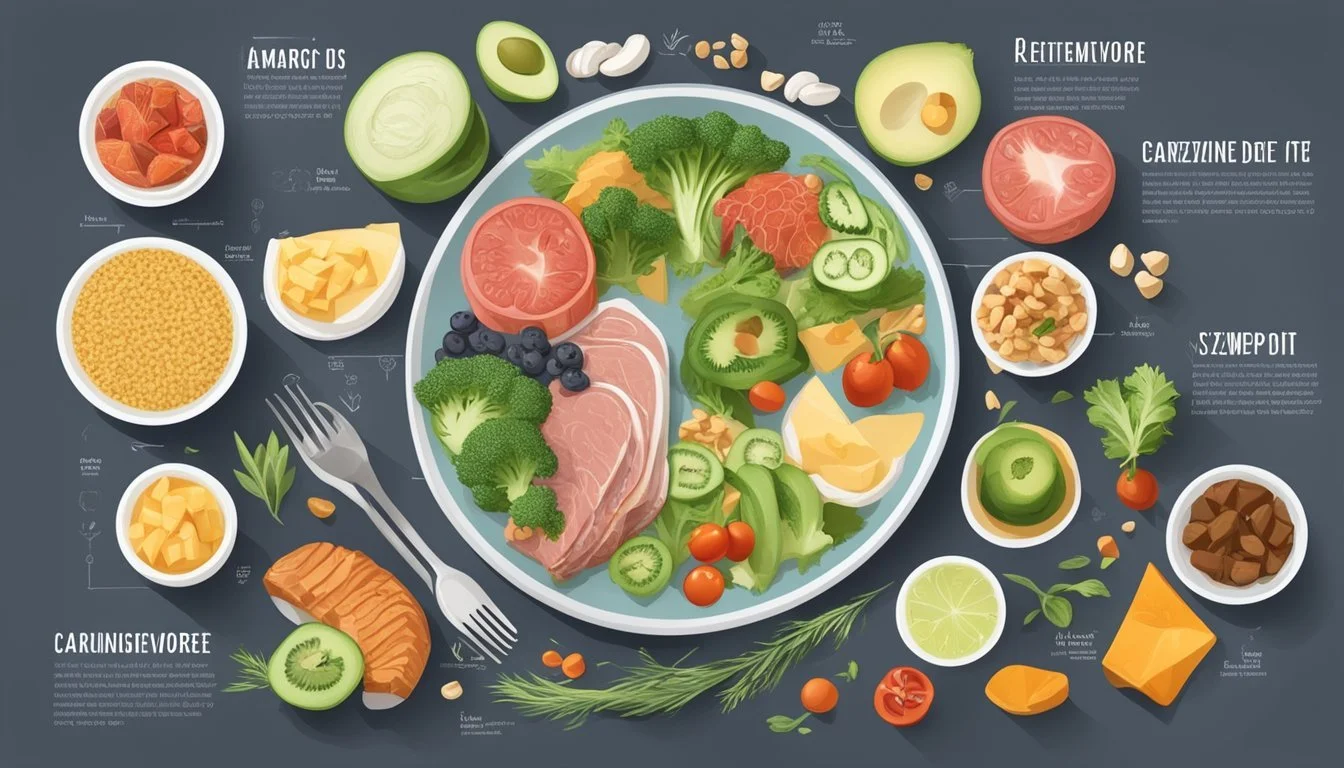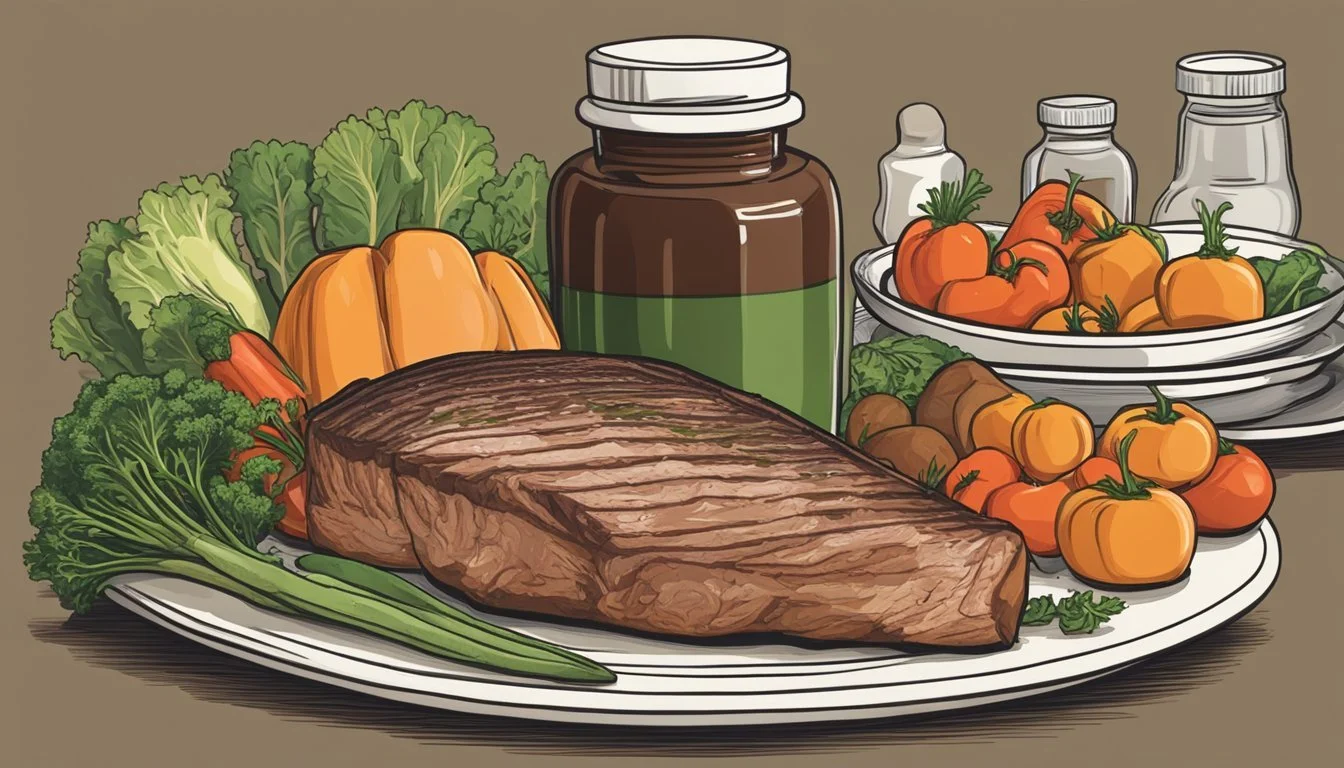Ozempic and Carnivore Diet
Unveiling the Interactions and Outcomes
The relationship between the use of Ozempic and adhering to a carnivore diet has become an area of interest for individuals seeking weight loss and improved metabolic health. Ozempic, generically known as semaglutide, is a medication approved for the management of type 2 diabetes, and more recently, for weight loss. It functions as a GLP-1 agonist, stimulating insulin secretion and reducing appetite. The carnivore diet, characterized by the exclusive consumption of animal products, is gaining popularity due to its simplicity and potential benefits for weight loss and blood sugar control.
While Ozempic works pharmacologically to regulate blood glucose levels and decrease appetite, the carnivore diet's approach to nutrition focuses on reducing carbohydrate intake, which may naturally lead to lower blood sugar and decreased hunger. The high protein and fat content in the carnivore diet helps sustain satiety, which can complement the appetite-suppressing effect of Ozempic. Weight loss is often an observed outcome of both interventions—which may be enhanced when combined due to their synergistic effects on satiety and blood sugar regulation.
However, it's important to consider the dietary composition and individual health goals when integrating Ozempic with the carnivore diet. The diet's restriction to animal products can lead to nutritional considerations, and Ozempic's dosage and potential side effects should be managed under medical supervision. Careful planning and monitoring are crucial to ensure the combined approach promotes health and aligns with the individual’s overall wellness strategy.
Understanding Ozempic
Ozempic is a medication known for its role in managing Type 2 diabetes and aiding in weight loss, due to its effects on blood sugar and insulin regulation.
Mechanism of Action
Ozempic, also known by its generic name semaglutide, operates by mimicking an incretin hormone called GLP-1 that is naturally produced in the body. This hormone is responsible for:
Stimulating insulin release in response to high blood sugar levels
Reducing the liver's production of glucose
Slowing down digestion, which helps in controlling appetite and food intake
Treatment for Type 2 Diabetes
For individuals with Type 2 diabetes, Ozempic serves as an adjunctive therapy to diet and exercise to improve glycemic control. It is not insulin but works complementary to it by enhancing the body's own ability to lower blood sugar levels. Key aspects include:
Improvement in blood sugar control, often measured by HbA1c levels
Reducing the risk of major cardiovascular events in adults with heart disease and Type 2 diabetes
Weight Loss Benefits
The slow digestion process caused by Ozempic can lead to a reduced appetite, which makes it a tool for weight loss in addition to its use in diabetes management. This weight loss occurs because:
Patients may consume fewer calories due to the increased feeling of fullness
Ozempic is often used alongside a balanced diet and exercise for optimum results
Carnivore Diet Explained
The Carnivore Diet focuses on consuming animal products exclusively and excludes plant-based foods. It emphasizes high protein and fat intake while eliminating carbohydrates typically found in fruits and vegetables.
Dietary Principles
The core principle of the Carnivore Diet is to consume only animal-based foods. This includes:
Meat: Beef, pork, chicken, lamb, and others
Fish and Seafood: All types of fish and shellfish
Eggs: Chicken, duck, and other avian eggs
Dairy: High-fat options like cheese and butter are preferred; milk is often limited due to its higher sugar content
The diet eliminates all plant-based foods, which means no fruits, vegetables, grains, legumes, nuts, seeds, or any products made from these items. Followers aim to get their nutrients solely from animal sources.
Potential Health Benefits
Proponents argue that this diet can lead to various health benefits, which may include:
Weight Loss: Due to its low-carb nature, it may lead to a state of ketosis, which is associated with weight loss.
Blood Sugar Control: Limited sugar and carbohydrate intake can result in lower and more stable blood sugar levels.
Simplicity: The diet is straightforward, consisting solely of animal products, which some find easier to follow.
It is commonly recognized that the diet provides a high level of protein and healthy fats, which are essential for bodily functions. However, scientific research is limited, and most evidence is anecdotal.
Common Challenges and Limitations
While this diet may have proponents, it also presents several challenges:
Nutrient Deficiencies: Potential lack of certain vitamins and minerals that are primarily found in plant-based foods, such as Vitamin C and fiber.
Social and Lifestyle Constraints: Dining out or social events can be difficult due to the restrictive nature of the diet.
Long-Term Health Effects: Limited long-term studies on the diet's impact make it hard to predict potential health risks associated with such restrictive eating patterns, like heart disease related to high saturated fat intake.
The Carnivore Diet represents a significant departure from conventional dietary recommendations, which generally encourage a balanced intake of protein, fats, and carbohydrates from both animal and plant sources. Individuals considering this diet should consult healthcare professionals.
Combining Ozempic with Carnivore Diet
When individuals with type 2 diabetes merge the use of Ozempic with the carnivore diet, they often aim for enhanced blood sugar control and weight loss. It's essential to understand the synergies between the medication and the diet as well as the necessary dietary adjustments to optimize results.
Synergies and Concerns
Ozempic is a medication used to improve blood sugar control in adults with type 2 diabetes. It functions by mimicking a hormone that stimulates insulin secretion. The carnivore diet, which emphasizes consumption of primarily meat and animal products, may promote weight loss and blood sugar stabilization through low carbohydrate intake. Together, they might offer a complementary approach to diabetes management.
However, concerns arise when combining medication with a restrictive diet. Both Ozempic and the carnivore diet may cause digestive issues such as nausea, diarrhea, vomiting, constipation, and stomach pain. While Ozempic slows stomach emptying, the high-protein nature of the carnivore diet requires efficient digestion, potentially leading to conflicts.
Dietary Adjustments for Optimal Results
To achieve optimal results while minimizing side effects, dietary adjustments should focus on:
Protein Intake: Balance lean and fatty meats to support weight loss without overwhelming the digestive system.
Variety of Meats: Incorporate a range of meats, including beef, pork, chicken, and seafood, to ensure a variety of nutrients and fat compositions.
Monitoring: Keep a close tab on blood sugar levels to adjust meat intake and Ozempic dosage under a healthcare provider's guidance.
By taking these steps, patients may experience the intended benefits while keeping potential side effects at bay. It is paramount that patients consult with their healthcare provider before making any substantial changes to their diet or medication regimen.
Nutritional Considerations
When combining Ozempic with a carnivore diet, individuals must consider the implications on nutrition and carefully manage their intake to avoid deficiencies while maintaining dietary effectiveness for blood sugar control and weight loss.
Avoiding Nutrient Deficiencies
A carnivore diet consists predominantly of animal products, which can lead to nutrient deficiencies if not properly managed. Particularly, one could fall short in vitamin C, fiber, and certain B-vitamins typically found in plant-based foods. To avoid these deficiencies, individuals should consider incorporating organ meats such as liver, which are rich in nutrients not found in muscle meats.
Online stores offer unbeatable prices for vitamin C, fiber supplement, and vitamin B, so don't miss out!
Focus on Macro and Micronutrients
Protein is abundant in a carnivore diet, however, attention to both macronutrients and micronutrients is crucial for overall health. While meats provide essential amino acids, individuals need to balance their macronutrient intake by including a variety of animal-based products. Fish, for example, adds essential fatty acids and vitamin D.
Micronutrients, such as zinc and selenium, can be sourced from nuts like Brazil nuts and almonds, though strict carnivores might opt for seafood and eggs. Below is a chart of food sources rich in both macro and micronutrients:
Protein
Food Sources: Beef, chicken, fish
Fiber
Food Sources: (Not applicable in a strict carnivore diet)
Fat
Food Sources: Fish, egg yolks, marrow
Vitamins
Food Sources: Organ meats, eggs
Minerals
Food Sources: Shellfish, *nuts
*Note: Nuts are not traditionally included in a carnivore diet but may be considered by some individuals looking to broaden their nutrient profile.
Impact on Digestive Health
Fiber plays a significant role in digestive health, acting as a bulking agent to facilitate bowel movements. A carnivore diet typically eliminates high-fiber foods such as vegetables, legumes, and whole grains, which may lead to digestive issues for some individuals. It is imperative for those on the carnivore diet, especially when taking Ozempic, to monitor their digestive health and consider the need for a fiber supplement if necessary.
Side Effects and Management
When considering the combination of Ozempic and the carnivore diet, patients should be aware of the side effects associated with the medication, as well as the nutritional challenges posed by the diet. Management strategies are crucial for minimizing discomforts and ensuring health and safety.
Common Side Effects of Ozempic
Ozempic, a medication used primarily for blood sugar control and weight loss, has a profile of side effects that patients may encounter:
Nausea: This is frequently reported but tends to decrease over time.
Diarrhea/Vomiting: These gastrointestinal symptoms can occur, requiring dietary adjustments and sometimes medical intervention.
Constipation: It may manifest due to the medication's effect on digestive motility.
Patients are advised to report any persistent side effects to their healthcare provider. Ongoing monitoring and dosage adjustments by a medical professional can mitigate most issues.
Addressing Carnivore Diet Concerns
The carnivore diet eliminates all plant-based foods which may result in certain nutritional deficiencies or digestive issues if not properly managed. Crucial considerations include:
Nutrient Deficiencies: Ensuring an intake of all essential nutrients can be challenging without plant-based foods.
Digestive Issues: Some individuals might face a lack of fiber, leading to constipation. Incorporating a variety of meat sources can aid in digestion.
Hair Loss: Though not common, a drastic change in diet can sometimes lead to hair loss due to nutrient gaps or stress on the body.
Individuals should consult a dietitian to tailor the carnivore diet to their specific needs, and to plan for supplementation if necessary. Regular blood work can help monitor nutrient levels and overall health.
Medical and Healthcare Guidance
When considering the combination of Ozempic and a carnivore diet for managing health conditions such as type 2 diabetes, seeking professional medical guidance is essential. Healthcare providers play a vital role in tailoring treatment plans that safely incorporate effective strategies for each patient's unique needs.
When to Seek Medical Advice
Patients are advised to seek medical advice before starting on Ozempic or any significant dietary changes such as the carnivore diet, especially if they have pre-existing health conditions like type 2 diabetes. Initial consultation with a healthcare provider is crucial for:
Diagnosis: Accurate diagnostics ensure the appropriate management of type 2 diabetes and other related health issues.
Treatment Planning: Safe and effective use of Ozempic, in conjunction with dietary changes, requires a plan that considers the patient's medical history and current health status.
Patients should have regular follow-ups to monitor their condition and adjust treatment as necessary.
Role of Healthcare Providers
Healthcare providers, including doctors and specialists, are responsible for:
Assessment: Evaluating the patient’s health and determining if the combination of Ozempic and a carnivore diet is suitable.
Prescribing Medication: Guiding patients on the proper use of medications like Ozempic for the treatment of type 2 diabetes.
Monitoring: Keeping track of the patient's progress and any potential side effects or interactions between the medication and the dietary regimen.
Education: Informing patients about the risks and benefits of their treatment choices and supporting them in making informed decisions.
Healthcare providers act as stewards of their patient's health journey, ensuring treatments align with best practices and patient safety.
Associated Risks and Considerations
This section closely examines the notable risks and necessary considerations associated with combining Ozempic with a carnivore diet in the context of weight loss and blood sugar management.
Addressing Long-term Sustainability
The carnivore diet, which emphasizes the consumption of animal products while excluding other food groups, raises questions about its long-term sustainability given its restrictive nature. Nutrition experts assert that such a diet might lead to nutrient deficiencies over time and recommend regular health monitoring if one chooses to adopt this pattern of eating. Furthermore, while Ozempic, a medication that can affect appetite and gastric emptying, may aid in weight loss, combining it with an exclusionary diet could potentially impact body image and relationship with food.
Understanding Potential Health Risks
Individuals considering Ozempic in conjunction with a carnivore diet should be aware of potential health risks. Ozempic is known to affect blood sugar levels; hence, it's imperative to seek medical advice before making any dietary changes, especially where diabetes management is concerned. Additionally, health sources highlight concerns about severe gastroparesis—a condition that slows or stops the movement of food from the stomach to the small intestine—as an adverse effect of medications like Ozempic. It is critical to monitor for signs of this condition, as it could exacerbate hunger management and overall health.
People must evaluate both the intended benefits and possible risks to make an informed decision about combining the pharmaceutical and nutritional approaches to health, considering their specific medical circumstances and personal health goals.
Conclusion
Research and clinical experience suggest that Ozempic (semaglutide), a GLP-1 receptor agonist, can be effective for weight loss and blood sugar control. Individuals with type 2 diabetes may particularly benefit from its use. However, potential side effects such as nausea or more severe reactions should be considered when using this medication.
The carnivore diet, exclusive to animal products, also presents a potential route for weight loss. Anecdotal evidence indicates that it may contribute to weight reduction and simplifying dietary decisions, though such a diet's long-term health effects require more investigation.
When considering Ozempic in conjunction with a carnivore diet, individuals should approach their dietary decisions with careful consideration of their personal health profile. They should consult healthcare professionals for nutritional advice to ensure that any action taken contributes positively to their overall well-being.
In summary:
Ozempic may improve blood sugar control and support weight loss.
Carnivore diet could lead to weight loss but lacks comprehensive studies.
Users must be aware of possible side effects with any medical or dietary regimen.
Professional guidance in dietary decisions is crucial to maintain nutritional balance and health.
They must remember that each person's response to medication and dietary changes can differ, and a personalized approach is vital.








